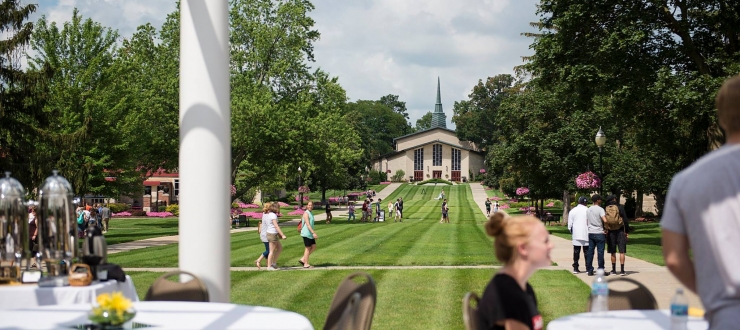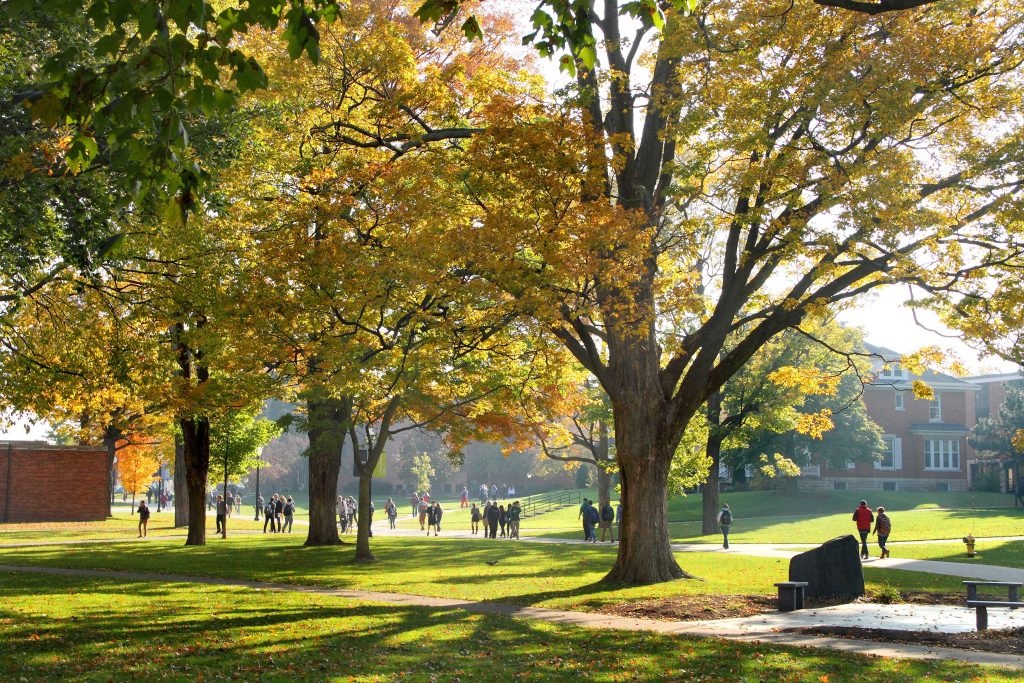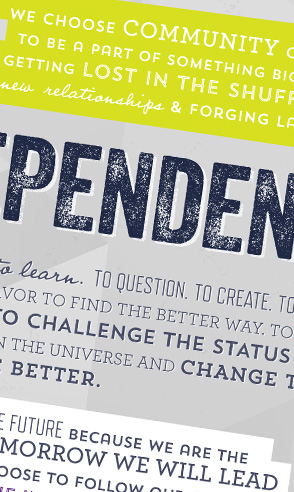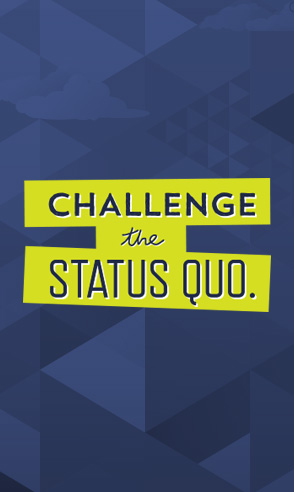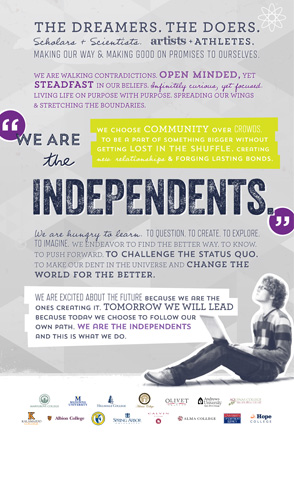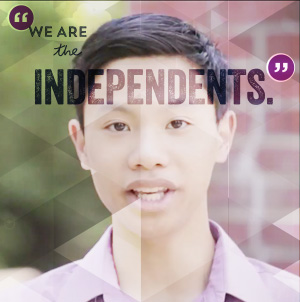Blog - Category: Campus Tours
Make Your College Campus Visits, Virtually
While in-person admissions visits at Michigan’s top 14 private colleges and universities have been canceled due to the coronavirus pandemic, prospective students can still explore these beautiful campuses with the click of a button!
With virtual tours available, you can still get the chance to “walk” the campus, see and feel what life could be like for the next four years. The online tours not only give you a peak into each campus, but many schools even allow you to schedule an online information session with a live admissions counselor! Get your questions answered and make an informed choice now from the comfort of your home.
Get more information in the links below:
Alma College Virtual Tour | Schedule a Virtual Visit
Andrews University Virtual Tour | Sign up for a Virtual Preview
Aquinas College Virtual Tour | Schedule a Virtual Personal Visit
Calvin University Virtual Tour | Schedule a Virtual Visit
Hillsdale College Schedule a Virtual Visit
Hope College Virtual Tour | Schedule a Virtual Visit
Kalamazoo College Virtual Tour | Schedule a Virtual Visit
Madonna University Campus Tour Video | Schedule a Virtual Visit
Siena Heights University Virtual Tour
Spring Arbor University Virtual Tour | Schedule a Virtual Visit
University of Detroit Mercy Virtual Tour | Sign up for a Virtual Information Session
When is the best time to visit colleges?
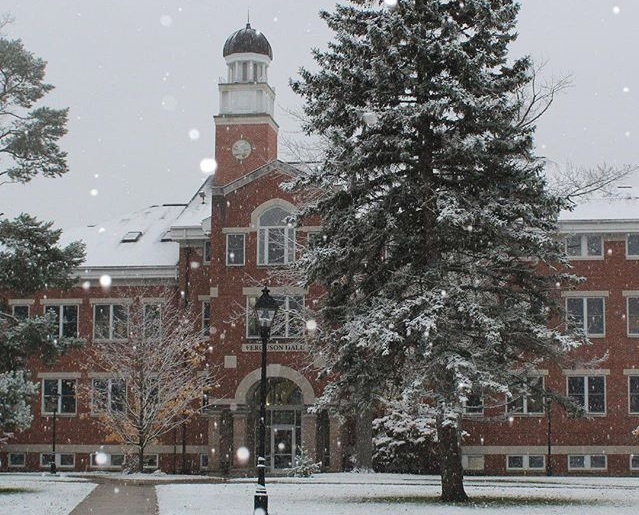
(Albion College, voted 12th Most Beautiful College in Winter)
It’s winter, and the tundra is setting in – at least it is here in Michigan. The last thing you are thinking about is planning a trip to visit campuses. Those long walks across snow-covered quads are certainly less appealing when the temperatures are teetering at the same level as the number of layers you’ll be wearing to stay warm. Or maybe you are a freshman or sophomore, and it’s just “not time yet.”
So, “When is the best time to visit?” The answer may not be what you expect. Here are some tips for getting the most out of campus visits:
Time of year:
As summer strolls in and the school year winds down, families across the country are gearing with plans to visit college campuses. Tours are crowded, staff is minimal, and quads are relatively barren. Although the summer months are more convenient for your time, ideally you should try to plan your visits when classes are in session and the campuses are full of life. Think of it like trying on a pair of new shoes: do you get the proper assessment while sitting? No, you get up, walk around, and perhaps jog in them… as it should also be done visiting campuses. Simulate the day-to-day as if you are attending the school. It doesn’t necessarily mean go in the dead of winter, but consider this: it may be cold, but it’ll also be cold while you attend, won’t it?
Age of student:
It can be very rewarding to visit colleges and universities before your junior and senior year (read: before it’s decision time). You are less concerned about choosing and “buying” when you are simply “window shopping” and more interested in checking out the inventory. Expose yourself to as many different kinds of places—big schools, small schools, research universities, liberal arts colleges, urban campuses, places way out in the country—to develop a broad perspective of all the different options. Then, when it is time to make a decision, you’ll have a better foundation on which to choose.
Before stepping foot on the first campus (and each one after that…):
Your new mantra: Relax, enjoy, decide later. Resist the impulse to judge immediately, good or bad. Your first reaction is bound to be emotional, and usually overly positive—college is really cool! Sleep on it. Weigh your impressions against the other schools you visit and try to remain as objective as possible so your rose-colored glasses don’t allow you to overlook things.
How to choose:
As you visit the campuses, allow your senses to guide you. Really like something? Take note of it. Feel like something’s missing? Take note of it. Gut instinct is usually pretty accurate. Additionally, the perceptions from your visits will come in handy when completing your college applications. Remember this: tying personal experience to the campus environment will blow the minds of the admissions department!
What to look for:
Focus on fit. We perform at our best when we have a level of comfort, belonging, and value. Questions to ask yourself: How does the college meet my academic needs? Will I be challenged appropriately? Is the style of instruction a good match for how I learn? Does the college offer a community that makes me feel “at home?” Does the college offer extracurricular activities that interest me?
After the visit, before you leave:
Connect with the recruiter. Colleges and universities typically assign admissions personnel to different areas of the country for recruiting efficiency. If your area’s recruiter is available, definitely introduce yourself. Either way, get that person’s contact information. Consider him/her as your “go to” person when you have important questions later in the admissions process. And remember this: there is nothing insignificant nor too embarrassing to ask. The admissions staff is there to help!
What to do next:
Record your visit. Make notes as soon as you are able. The more campuses you visit, the more they will begin to blend together, especially from memory. Take pictures to give yourself a visual index of what you’ve seen to avoid confusion later.
And finally:
Enjoy the process. It can be easy to get lost in the excitement and have that energy turn into anxiety. Relax. Start the search early. Visit during the school year to witness the campus’s true environment. Trust your senses and take notes.
As you map your college visit road trip, include a few of Michigan’s top 14 private colleges and universities on your list. These schools are purposefully smaller and emphasize “community over crowds.” Often comparable in cost to Michigan’s public institutions, the independents boast higher four-year graduation rates, outstanding faculty who help students forge their own paths, and smaller class sizes for a truly unique and personal experience.
Be bold. Be different. Go independent.
Your One-Stop, College Admissions Connection: Virtual College Fair
We’ve said it before. The best way to choose your own path is to visit a college campus… or three. Breathe the air. Wander the student center. Sit in on a lecture. Chat up a few professors. Grab a meal in the dining hall. Stroll through the quad.
But the college search doesn’t usually start with a visit to campus. You might begin by looking at websites or admissions booklets, or attending a college fair to learn more. Pixels and pages are a start, but nothing beats talking to a person, and college fairs can be time consuming to attend. Now, there’s a solution!
Enter the Virtual College Fair. It’s never been easier to connect with a college admissions office and get your big questions answered.
The Virtual College Fair offers free access to video recordings and live streams from Michigan’s top private colleges and universities. Watch the recordings, pick your favorites (or pick them all!), and then register – individually or with your family – to attend a live and interactive web-based Q&A session with admissions and other college representatives. Learn more here.
Like what you hear? Reach out to the college to continue the conversation and maybe even schedule a visit!
Upcoming Live Q&A Sessions
December 4, 2018 at 7 PM: Alma College
December 4, 2018 at 8 PM: Aquinas College
December 5 , 2018 at 7 PM: Madonna University
December 6, 2018 at 7 PM: University of Detroit Mercy
December 6, 2018 at 8 PM: Calvin College
December 11, 2018 at 7 PM: Albion College
December 12, 2018 at 7 PM: Spring Arbor University
December 13, 2018 at 7 PM: Hillsdale College
Adrian College Welcomes 1,500 Visitors to Campus for Annual Sneak Peek Day
Adrian College hosted its annual Sneak Peek Day in July, welcoming over 1,500 attendees to campus. As in the past, the event offers visiting freshmen a glimpse of campus accommodations, student life and the opportunity to meet with their roommates to plan for the fall semester. Students and their families perused the Adrian College Bookstore, dined at Ritchie Marketplace and toured around the Mall to meet fellow incoming Bulldogs.
Corinne Fereshetian, a freshman from Farmington Hills, Michigan, attended Sneak Peek Day despite previously touring campus on recruitment visits. “I am so excited to start school at AC this fall. The campus is beautiful and everyone is always friendly,” she said. “I am most looking forward to spending time in all of the new facilities and cheering on other teams in Arrington.”
Staff and faculty were available throughout the event to answer questions, discuss the upcoming fall semester and provide a first-hand tour to incoming students, family and friends. Sneak Peek Day also provided full access academic buildings and dorms, as well as offered drawings with prizes such as mini-fridges and an iPad. Many students also pre-registered for their fall classes in anticipation of Welcome Week in August.
“It was really helpful to have so many professors and students on campus during Sneak Peek Day, but I also liked that we had our own time to explore campus,” said Elizabeth Hume from Wheaton, IL. “Being on this kind of campus is so unique because you’re able to get to know all of your classmates, and there are ample opportunities for every single person to excel both in and outside the classroom.”
Experience the magic of Sneak Peek Day, check out the recap video!
Ready to visit a campus for yourself? Check out our listing of on campus events and visit days.
Questions to Ask on your Next College Visit
Colleges offer open houses and campus tours all year long. But summer can be a great, low stress time to schedule a campus roadtrip. Nothing beats getting your feet on the ground to decide if a college is the right fit for you, so don’t wait to schedule one (or three). Absorb the tours but wander off the beaten path. Talk to students in the bookstore. Go to the campus coffee shop.
Is this a place you can picture yourself? So much of campus tours are about feel but it can be an overwhelming process. There’s a lot to absorb. Take lots of notes and snapshots to refresh your memory in a few months.
If you need a kick starter on things to ask, here are some questions to pose to yourself and your tour guide:
College and Campus
- Is the size and location of the campus appealing to you?
- Is the character of the campus appealing to you?
- Do the programs and majors offered fit your potential career interests?
- What type of orientation introduces a new student to campus life?
- Are there stimulating social and intellectual opportunities — lectures, debates, concerts? Are they well attended by faculty and students?
- Where do most students live — on or off campus?
- What percentage of students return the following year?
- What is the graduation rate after 4 years? 6 years?
Teaching and Advising
- What is the average class size?
- Who teaches first-year classes — professors or teaching assistants?
- How much exposure to top faculty will students have in their first two years?
- How extensively does the college rely on part-time or adjunct faculty?
- Are faculty members available to talk to first-year students about their academic disciplines and provide career guidance?
- What kind of email availability and office hours do professors offer?
- How many students are assigned to an academic advisor? Will the advisor be a professor?
- Is good teaching valued and used as a criterion for tenure and promotion?
- Does teaching include more than lecturing? Are students encouraged to work together, to discuss topics in class, to do self-directed independent projects?
- Can students work with a faculty member doing academic or scientific research while they are undergraduates?
- Do students participate in a senior seminar or design a senior project to demonstrate mastery of their major field of study?
- How is technology used in teaching and learning?
Support Services
- Does the college have a program to identify students having academic or personal issues, and programs to help them?
- Are tutors, skill centers, writing assistance, counselors provided?
- What kind of tools, resources and training does the library provide?
- What kind of technology (Wi-Fi, laptops, computer labs, etc.) is available?
Beyond the Classroom
- What happens after class and on weekends?
- Do students take advantage of athletic, cultural, religious or other campus events?
- What kind of off-campus or study abroad programs does the college offer? What percentage of students participate?
- What internship or career exploration opportunities are available?
- What kinds of student organizations are on campus?
Values
- How does the college demonstrate a commitment to diversity?
- What opportunities are there for community service and/or religious activities?
- How do students treat each other?
Careers
- What services does the career development office provide?
- What kind of careers do alumni have?
- Do alumni help identify opportunities for recent grads?
- What kinds of networking opportunities exist for alumni?
As you map your college roadtrip, include a few of Michigan’s top 14 private colleges and universities on your list. The colleges are purposefully smaller and emphasize community over crowds. Often comparable in cost to Michigan’s public institutions, the independents boast higher four-year graduation rates, outstanding faculty who help students forge their own paths, and smaller class sizes for a truly unique and affordable experience.
Be bold. Be different. Go independent.
Top 10 Things High Schoolers Should Do to Get Ready for College

Happy New Year! Time for new beginnings, new hope and, sure, even some new worries. But getting ready for college doesn’t have to be one.
There’s tons of resources out there to help map out the journey. As with any monumental journey, the best bet is to bite it off in short increments and start early.
Here are ten tips to make your transition to college easier.
1. Make a calendar
Goals are easier if they are visualized. Get a giant desk calendar and some fancy pens and highlighters. Stick it on your wall and mark it up with dates for specific tasks like taking the SAT.
2. Practice, practice, practice
Register for the preliminary SAT and National Merit Scholarship Qualifying Test. The tests are usually given in October, help you prepare and can be used to enter into scholarship competitions. Best of all: They can be taken in a classroom.
3. Make a list. Check it twice
Write down a list of 10-20 schools to investigate – we think these 15 outstanding independent colleges and universities in Michigan should be on the list. Separate them into categories: Top choices, tier twos and fallbacks. Dream big. Do your research. Talk to counselors and teachers.
4. Research Scholarships
Tons of money is available. Millions of dollars go unclaimed each year. Get your money’s worth from the guidance counselor, do your research and start prioritizing. We really like this one.
5. Letters of recommendation
Most wait until the last minute. Don’t be that guy. Ask early.
6. Campus visits
Colleges offer open houses and campus tours all year long. Don’t wait to schedule one (or three). Absorb the tours but wander off the beaten path. Talk to students in the bookstore. Go to a coffee shop.
Is this a place you can picture yourself? So much of campus tours are about feel but it can be an overwhelming process. There’s a lot to absorb. Take lots of notes and snapshots to refresh your memory in a few months.
7. The nitty gritty
Fall of senior year is typically when the search hits high gear: Taking or retaking SATs or ACTs, writing and perfecting admissions essays, scheduling interviews, exploring costs and financial aid and completing the free application for federal student aid.
Phew. Take a breath. It’s going to be OK.
8. Enter to win the easiest scholarship contest on the planet
Top off your college fund by entering the We Are The Independents monthly scholarship drawing from the Michigan Colleges Alliance. You could win $2K in 2 minutes.
9. Make a call
Decisions, decisions. At some point, fate is out of your hands. It can be an anxious time. But if you’ve done everything on the list, take a bow. Even if you haven’t but have met all the deadlines, take a bow. There’s nothing you can do about it now but wait.
We understand that at Michigan’s top 15 independent colleges and universities. The colleges are smaller and emphasize community over crowds.
Often less expensive than public institutions, the independents boast higher four-year graduation rates and smaller class sizes for a truly unique and affordable experience.
Be bold. Be different. Go independent.
Sorry, juniors. Winter break is a good time to start the college search
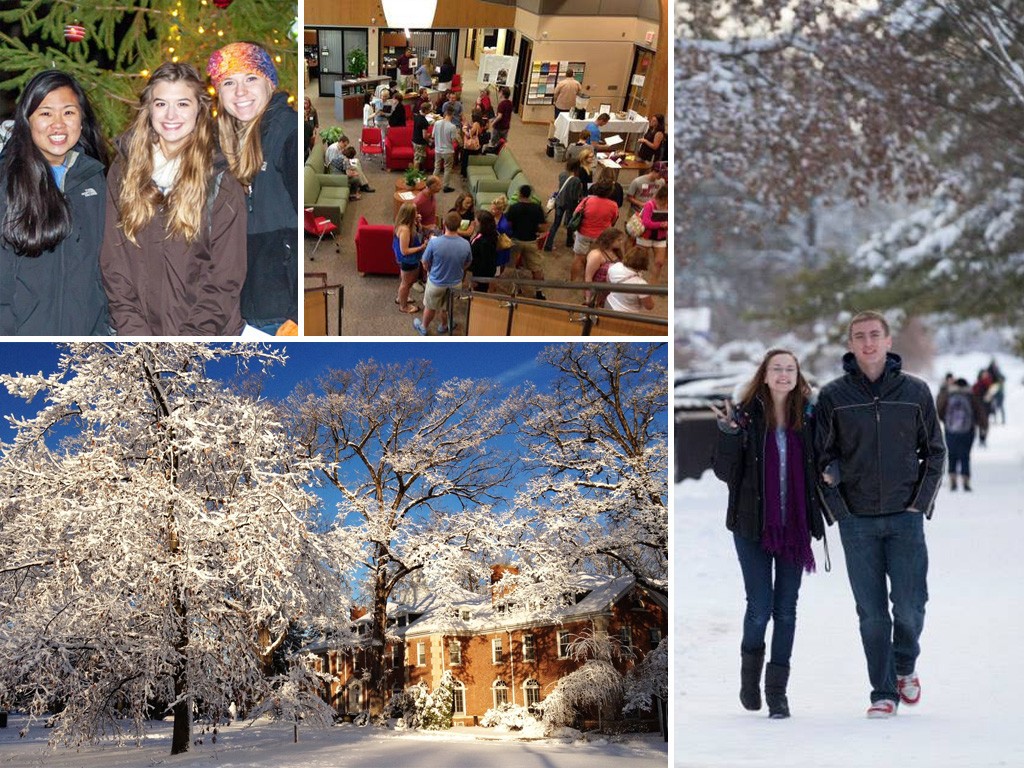
Instead of hitting the slopes or sledding hills this Christmas break, it’s a good time for high school juniors to start seriously thinking about their college search.
We know. It’s heresy to think of such things on break. But the fact is the next year and a half is going to be a whirlwind and now is the time to develop a plan for applying to colleges if you haven’t already.
Don’t freak out if you haven’t. The heavy lifting – essays, recommendations, tests – are still a ways off. But now is the time to start a schedule and chart a to-do list and timeline for the college search.
The good news: Most of this stuff now is quick and about laying a framework for the future. You’ll have plenty of time to see “Star Wars: The Force Awakens” for the fourth time.
So here’s a few easy goals for the college search during winter break.
- Write out a schedule or timeline of the college search process. There’s tons of resources online, including one from the College Board.
- RSVP for a campus visit day or two. Keep an eye out for special overnight visits or visit days for athletics, arts or majors. You can find plenty of interesting options on the We Are The Independents campus events schedule.
- Make an appointment with your guidance counselor to discuss ways to improve the process and any tips s/he may have.
- Review PSAT scores and look for areas of improvement. They typically arrive in December.
- Sign up to take the SAT in the spring. Register online or through school. Practice books are available online at The College Board.
- Start thinking about financial aid sources. There’s a good overview at studentaid.ed.gov
- If you’re in Advance Placement Program classes, register for AP exams when you get back to school.
- Take two minutes to enter the easiest scholarship contest you can win, the We Are The Independents monthly scholarship drawing from the Michigan Colleges Alliance.
That’s it. Go have fun. Sorry about the lack of snow. Or you’re welcome. Whichever applies.
And one more thing: Start researching Michigan’s top 15 independent colleges and universities.
Like you, the schools are truly unique and exceptional. All prize themselves on their award-winning faculty and providing a college experience that’s unlike those at traditional big state schools.
Class sizes are low. So students are taught by professors, rather than graduate students. They form lifelong bonds with professors, who are experts in their field and can help students discover their passions.
It’s one of many reasons the independents boast higher four-year graduation rates. And why graduates of independents are often quicker to find jobs in their fields.
And despite what you’ve heard, the colleges are often more affordable than state schools.
Be bold. Be different. Go independent.
Why your junior year of high school is your first year of college

It’s hard to believe, but at this time next year, you’ll be graduating from high school and starting college in the fall.
Do you know what you want to study? Where you want to study? What type of college, campus and experience you prefer? How you’re going to pay for it all?
Relax. Breathe deep. You’re at the start of a really exciting, interesting and fun time. You have plenty of time to take it all in, plan and make all those big decisions. You just need to get started.
The college search usually starts with clicking through a bunch of websites and leafing through a few fancy brochures. Unfortunately, pixels and pages are no substitute for getting boots on the ground. You need to experience a college campus first hand.
Breathe the air. Wander the student center. Sit in on a lecture. Chat up a few professors. Grab a meal in the dining hall. Stroll through the quad.
Try several colleges on for size
Michigan is blessed with many outstanding college options. There’s the big state universities. The specialized trade schools. And there’s Michigan’s smaller independent colleges and universities. Each has its own unique attributes. Its own unique vibe.
Are you seeking community or looking for a crowd? Do they offer the programs you want to study? Are they flexible when you change majors and then change again? It’s so important to find that right fit.
That fit can make all the difference. Research suggests that the “fit factor” (choosing a college most compatible with your learning, social, and extracurricular interests) is one of the most important determinants of academic success and earning an undergraduate degree.
The best way to choose your own path is to visit a campus or three. Grab some friends. Make it a road trip.
Colleges know how important campus visits are for high school juniors. That’s why so many host special sessions every spring like Spring Arbor University‘s Junior Exploration or Hope College‘s Junior Day or Hillsdale College‘s Junior Visit Day or Alma College‘s Junior Day.
Whichever you choose, visit early and visit often. Life moves by pretty fast, if you don’t stop and look around, you just might miss it.
Follow your own path. Be bold. Be different. Go independent.
Five tips to make the most of campus visits

Campus visits are so fun it’s easy to forget they’re one of the most important parts of the college application process.
Unlike essays and letters of recommendations, the visits are a chance to actually see and feel what life could be like in the next four or five years. 71% of students – that’s nearly three in four – said visits are the most trusted source of information about colleges, according to the Chronicle of Higher Education.
Even so, it’s easy to get caught up in the excitement and forget that the visits are meant to be fact-finding missions about a hugely important decision. With that in mind, here are five tips to make the most of the visits.
Start online
There’s no scratch and sniff yet, but several colleges have virtual tours online. Andrews University‘s virtual tour gives you a Sim City style bird’s eye view. Calvin College has a gorgeous tour on youvisit.com. Same with Aquinas College. While Adrian College, Siena Heights University, University of Detroit Mercy, Marygrove College, Albion College, Olivet College, Alma College, Hope College, Kalamazoo College, Madonna University and a host of others have videos and other resources at ecampustours.com.
Schedule tours
They can get time consuming, so it’s best to do so during high school breaks. Sign up for tours and meetings with admissions counselors. The good folks at the Michigan Colleges Alliance also have a great list of campus tours, open houses and events you can find here: http://wearetheindependents.com/events/
Deviate from the tour
Take at least three hours to yourself. Talk to students. Arrange to sit in on some classes. Eat at a dining hall. Look at the dorms. Wander through the quad alone. Go to the college bookstore. Wander off campus. Close your eyes: Is this a fit for you? Is this a place you can see yourself prospering? Does it feel right?
Do your research
Pepper people with questions: Is Wifi available campus-wide? What about network access in dorms? What’s the student-teacher ratio in your field of study? How secure is the campus? Read the last several issues of the student newspaper to get a sense of campus issues. Take photos and notes. There’s a lot to remember.
Meet with financial aid counselors
Inquire about aid. In most cases, there’s a big difference between advertised tuition and what students actually pay.
That’s certainly the case at Michigan’s 15 independent colleges and universities, which are often less expensive than public institutions. They boast higher four-year graduation and smaller class sizes for a truly unique and affordable experience.
The colleges are located in some of Michigan’s most beautiful towns and nurture students who value community over crowds and want to chart their own path
Be bold. Be different. Go independent.
Six Tips for Making the Most Important Decision of Your Life
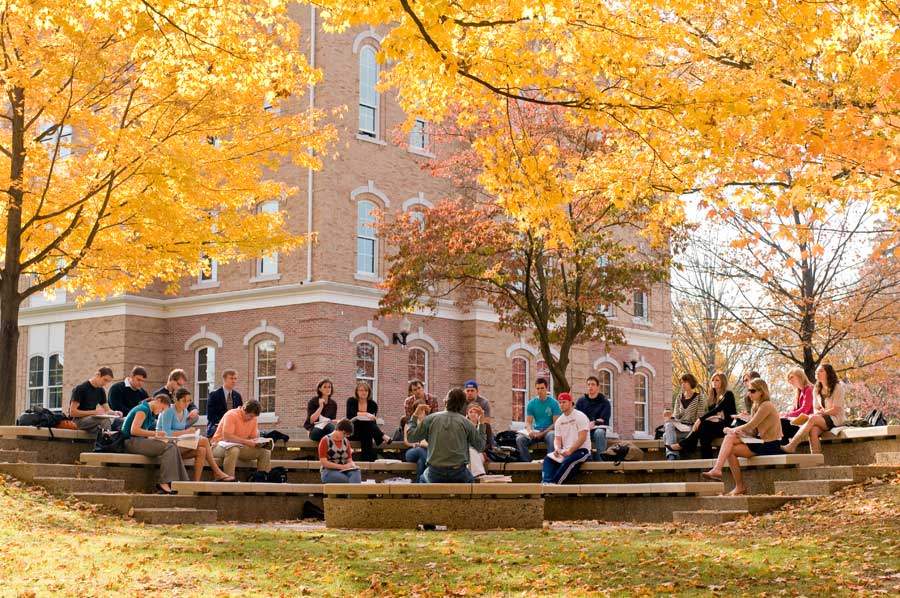
This is it. The most important decision of your life. Mess this up and your whole future is…Stop right there. Take a breath. It’s going to be OK. And probably even fun.
Sure, choosing a college is important. But it doesn’t need to cause hyperventilation. Like most overwhelming projects, applying to colleges is best managed through small, obtainable steps.
Watch your time
Quick. Look at the calendar. How many months before you start college? Junior and senior years can fly by. Make a calendar and note application deadlines. Work backwards and set incremental deadlines for parts of the process such as visiting campuses and writing essays.
Do your homework
First, meet your guidance counselor. As Albion College says, it’s their “job to help you succeed. Put them to work for you.”
Then gather information about colleges from anywhere you can – alumni, teachers, former students, mailings, online, campus rankings. Be a sponge. Create spreadsheets. Use old-fashioned paper. Start drafting pros and cons of each college but keep your mind open to change.
See for yourself
Check out your top picks in person. Go on the official tour. Go on the unofficial one as well. Talk to students and teachers. Step away from the tour group and linger in bookstores or the quad.
Can you see yourself there? What are the people like? What does your gut say? Be mindful of everyday considerations – how far is it from home, is it in an area you like? But be open to possibility and wonder. This is a place you’ll be for four years. You will change.
Strut your stuff
Take advantage of colleges, such as Hillsdale, that allow prospective students to interview. Make no mistake: They are judging you. But it’s also an opportunity for you to judge them, tell your story in person and set yourself apart.
Prepare for a gut check
Aim high. But keep your feet on the ground. At some point, most must ask: Can I afford this school? When you do, look beyond advertised tuition and research actual costs that are reduced through financial aid and scholarships.
More than 90 percent of students at Michigan’s top 15 independent colleges and universities, for instance, get financial aid. That drastically reduces costs. Consider four-year graduation rates. Most public institutions typically require five years to graduate. That increases tuition costs by 20 percent — tens of thousands of dollars. The graduation rate is double at private colleges, allowing students an extra year of earnings and experience in their careers.
Find your bliss
Do your best. Meet your deadlines. Then remember: Everything is out of your hands. Some disappointment probably is inevitable. So is amazement, joy and pride. Be serious. But don’t take things so seriously. Things have a way of working out.
Bonus Tip: Be Different.
Consider Michigan’s top 15 independent colleges and universities, where students forge success by following their own path. The colleges are smaller and emphasize community over crowds.
Often less expensive than public institutions, the independents boast higher four-year graduation rates and smaller class sizes for a truly unique and affordable experience.
Be bold. Be different. Go independent.



